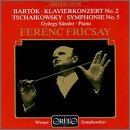| All Artists: Bela Bartok, Pyotr Il'yich Tchaikovsky, Ferenc Fricsay, Vienna Symphony Orchestra, György Sándor Title: Béla Barkók: Klavierkonzert No. 2; Tschaikowsky: Symphonie No. 5 Members Wishing: 0 Total Copies: 0 Label: Orfeo D'or Release Date: 12/12/1995 Album Type: Import Genre: Classical Styles: Forms & Genres, Concertos, Instruments, Keyboard, Symphonies Number of Discs: 1 SwapaCD Credits: 1 UPC: 750582795121 |
Search - Bela Bartok, Pyotr Il'yich Tchaikovsky, Ferenc Fricsay :: Béla Barkók: Klavierkonzert No. 2; Tschaikowsky: Symphonie No. 5
 | Bela Bartok, Pyotr Il'yich Tchaikovsky, Ferenc Fricsay Béla Barkók: Klavierkonzert No. 2; Tschaikowsky: Symphonie No. 5 Genre: Classical
|
Larger Image |
CD Details |
CD ReviewsAn unwavering reading of Bartok `s Second Concerto! Hiram Gomez Pardo | Valencia, Venezuela | 11/11/2005 (5 out of 5 stars) "Whoever is familiarized with the insatiable vigor and relentless impetuosity of this superb pianist knows also, that Sandor is far to be extent of that Hungarian and excel flavor, that almost has become a personal seal along his fruitful life. Gyrgy Sandor has known as any other pianist that enigmatic atmosphere from the first bars. The Second Concerto can be visualized as an entangled puzzle, a true kaleidoscopic colleague, where the anguish, desperation and hopeless don't seem struggle at all the enormous and portentous cosmic breadth that supports the work.
Bartok plays hard. Obviously you will find visible references to the historic moment in which was composed, but beneath the surface there is a whole universe, where the wholeness of the life seems to be drawn in those astonishing musical passages that integrate the movement. This is possibly the most complete, sharp and pyramidal of his three Concerts, measure by measure. But you have to be provided of the necessary and required emotional commitment and precision into the perception, to give a vision featured of full length. That implies to know until the most minimum detail every bar of this complex score and to emphasize the numerous anima stages that characterize this fabulous work. Even the treatment given to the First Movement owns interesting changes of rhythm and modulation, it seems not exist an absolute between composer and conductor. I admire deeply this director and regret immensely he has not conducted the Berlin Philharmonic instead Mr. K. The destiny of this superb Orchestra, undeniably would have been absolutely different at these times. The Final movement lacks of epic vision, specially in the last attacks. That can be understood from the perspective of the times in which was recorded. But the total understanding of this Symphony to my mind does not seem to be appreciated globally. If we admit the First Three Symphonies own a distinguished Imperial character and the three last ones, on the contrary are loaded of introspective character., Tchaikovsky would seem to blend both visions in this Symphony, employing this triumphal character of the Last movement as his last victorious statement, just before to write his Farewell sixth Symphony. So this duality of characters, may disturb and even trouble the preconceived attitude of a conductor, who mistakenly could be involved by the depressive burden of nostalgia, disaffection, tragedy and sad inflections for the past times. You should not forget the concepts of the same composer when wrote. " My Symphony I programmatic, but the program cannot be formulated in words. Basically my work is an imitation of Beethoven 's Fifth Symphony." That is why my appreciated reader, I think this work must be approached under this sense of dynamism and changing energy levels, because it is the only way to adequate the intentions of this emblematic Symphony. You must not be Romantic, Nationalist, Post Modernist or even to try to intellectualize it, because its intrinsic emotive character. This is a complex puzzle in which your arrangement must be previously understood, allowing the happenings lead the feelings and never, never in the opposite way. This live Concert was recorded on May 8 1955,in Vienna." |

 Track Listings (7) - Disc #1
Track Listings (7) - Disc #1